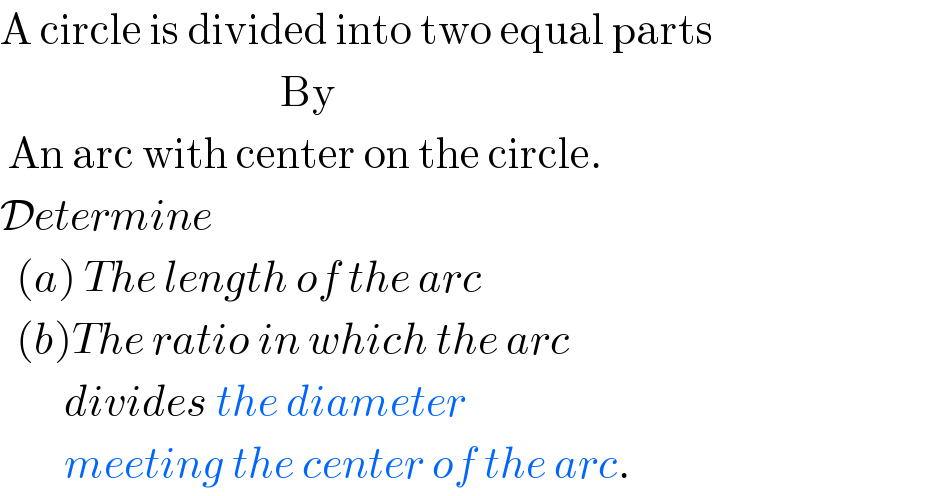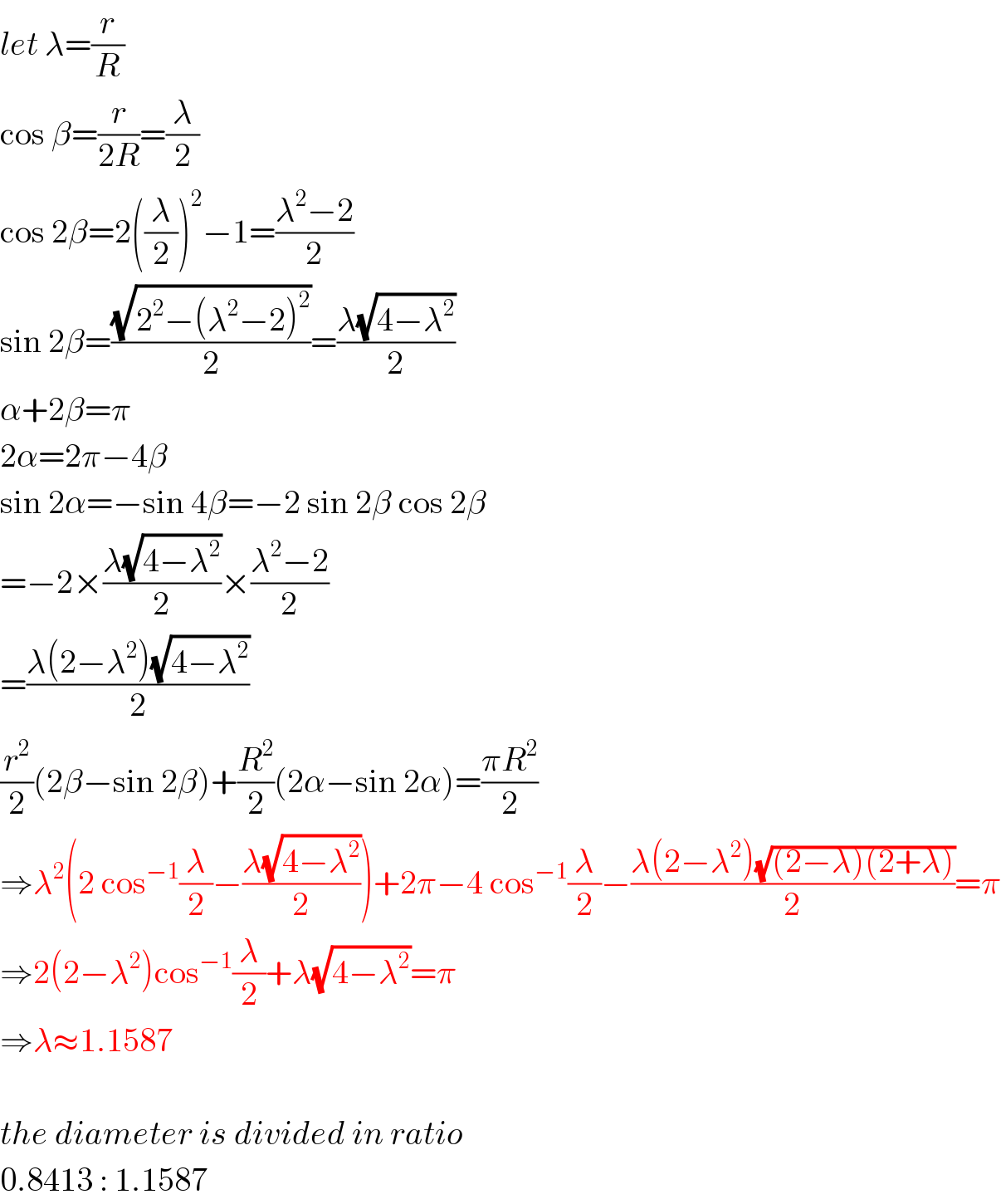
Question Number 68289 by Rasheed.Sindhi last updated on 08/Sep/19

$$\mathrm{A}\:\mathrm{circle}\:\mathrm{is}\:\mathrm{divided}\:\mathrm{into}\:\mathrm{two}\:\mathrm{equal}\:\mathrm{parts} \\ $$$$\:\:\:\:\:\:\:\:\:\:\:\:\:\:\:\:\:\:\:\:\:\:\:\:\:\:\:\:\:\:\:\:\:\:\:\mathrm{By} \\ $$$$\:\mathrm{An}\:\mathrm{arc}\:\mathrm{with}\:\mathrm{center}\:\mathrm{on}\:\mathrm{the}\:\mathrm{circle}. \\ $$$$\mathcal{D}{etermine} \\ $$$$\:\:\left({a}\right)\:{The}\:{length}\:{of}\:{the}\:{arc} \\ $$$$\:\:\left({b}\right){The}\:{ratio}\:{in}\:{which}\:{the}\:{arc} \\ $$$$\:\:\:\:\:\:\:\:{divides}\:{the}\:{diameter}\: \\ $$$$\:\:\:\:\:\:\:\:{meeting}\:{the}\:{center}\:{of}\:{the}\:{arc}. \\ $$
Answered by mr W last updated on 08/Sep/19

Commented by mr W last updated on 09/Sep/19

$${let}\:\lambda=\frac{{r}}{{R}} \\ $$$$\mathrm{cos}\:\beta=\frac{{r}}{\mathrm{2}{R}}=\frac{\lambda}{\mathrm{2}} \\ $$$$\mathrm{cos}\:\mathrm{2}\beta=\mathrm{2}\left(\frac{\lambda}{\mathrm{2}}\right)^{\mathrm{2}} −\mathrm{1}=\frac{\lambda^{\mathrm{2}} −\mathrm{2}}{\mathrm{2}} \\ $$$$\mathrm{sin}\:\mathrm{2}\beta=\frac{\sqrt{\mathrm{2}^{\mathrm{2}} −\left(\lambda^{\mathrm{2}} −\mathrm{2}\right)^{\mathrm{2}} }}{\mathrm{2}}=\frac{\lambda\sqrt{\mathrm{4}−\lambda^{\mathrm{2}} }}{\mathrm{2}} \\ $$$$\alpha+\mathrm{2}\beta=\pi \\ $$$$\mathrm{2}\alpha=\mathrm{2}\pi−\mathrm{4}\beta \\ $$$$\mathrm{sin}\:\mathrm{2}\alpha=−\mathrm{sin}\:\mathrm{4}\beta=−\mathrm{2}\:\mathrm{sin}\:\mathrm{2}\beta\:\mathrm{cos}\:\mathrm{2}\beta \\ $$$$=−\mathrm{2}×\frac{\lambda\sqrt{\mathrm{4}−\lambda^{\mathrm{2}} }}{\mathrm{2}}×\frac{\lambda^{\mathrm{2}} −\mathrm{2}}{\mathrm{2}} \\ $$$$=\frac{\lambda\left(\mathrm{2}−\lambda^{\mathrm{2}} \right)\sqrt{\mathrm{4}−\lambda^{\mathrm{2}} }}{\mathrm{2}} \\ $$$$\frac{{r}^{\mathrm{2}} }{\mathrm{2}}\left(\mathrm{2}\beta−\mathrm{sin}\:\mathrm{2}\beta\right)+\frac{{R}^{\mathrm{2}} }{\mathrm{2}}\left(\mathrm{2}\alpha−\mathrm{sin}\:\mathrm{2}\alpha\right)=\frac{\pi{R}^{\mathrm{2}} }{\mathrm{2}} \\ $$$$\Rightarrow\lambda^{\mathrm{2}} \left(\mathrm{2}\:\mathrm{cos}^{−\mathrm{1}} \frac{\lambda}{\mathrm{2}}−\frac{\lambda\sqrt{\mathrm{4}−\lambda^{\mathrm{2}} }}{\mathrm{2}}\right)+\mathrm{2}\pi−\mathrm{4}\:\mathrm{cos}^{−\mathrm{1}} \frac{\lambda}{\mathrm{2}}−\frac{\lambda\left(\mathrm{2}−\lambda^{\mathrm{2}} \right)\sqrt{\left(\mathrm{2}−\lambda\right)\left(\mathrm{2}+\lambda\right)}}{\mathrm{2}}=\pi \\ $$$$\Rightarrow\mathrm{2}\left(\mathrm{2}−\lambda^{\mathrm{2}} \right)\mathrm{cos}^{−\mathrm{1}} \frac{\lambda}{\mathrm{2}}+\lambda\sqrt{\mathrm{4}−\lambda^{\mathrm{2}} }=\pi \\ $$$$\Rightarrow\lambda\approx\mathrm{1}.\mathrm{1587} \\ $$$$ \\ $$$${the}\:{diameter}\:{is}\:{divided}\:{in}\:{ratio} \\ $$$$\mathrm{0}.\mathrm{8413}\::\:\mathrm{1}.\mathrm{1587} \\ $$
Commented by Rasheed.Sindhi last updated on 08/Sep/19

$$\mathbb{T}\mathrm{h}\alpha\mathrm{n}\chi\:\mathrm{for}\:\mathrm{this}\:\mathbb{N}\mathrm{ice}\:\mathbb{A}\mathrm{pproach}\:\mathbb{S}\mathrm{ir}! \\ $$$$\mathrm{Could}\:\lambda\:\mathrm{be}\:\mathrm{obtained}\:\mathrm{in}\:\mathrm{terms}\:\mathrm{of}\:\pi. \\ $$
Commented by mr W last updated on 08/Sep/19

$${i}\:{don}'{t}\:{think}\:{that}\:{the}\:{equation}\:{for}\:\lambda \\ $$$${can}\:{be}\:{exactly}\:{solved}. \\ $$
